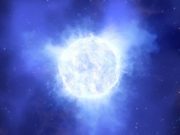First exposed planetary core discovered allows glimpse inside other worlds
The surviving core of a gas giant has been discovered orbiting a distant star by University of Warwick astronomers, offering an unprecedented glimpse into...
Quantum fluctuations can jiggle objects on the human scale
The universe, as seen through the lens of quantum mechanics, is a noisy, crackling space where particles blink constantly in and out of existence,...
New mathematical idea reins in AI bias towards making unethical and costly commercial choices
Researchers from the University of Warwick, Imperial College London, EPFL (Lausanne) and Sciteb Ltd have found a mathematical means of helping regulators and business...
TESS delivers new insights into an ultrahot world
Measurements from NASA's Transiting Exoplanet Survey Satellite (TESS) have enabled astronomers to greatly improve their understanding of the bizarre environment of KELT-9 b, one...
Respiratory droplet motion, evaporation and spread of COVID-19-type pandemics
It is well established that the SARS-CoV-2 virus responsible for the COVID-19 disease is transmitted via respiratory droplets that infected people eject when they...
Physicists explain why changes to Earth’s magnetic field are weaker over the Pacific
A new study by University of Alberta physicists provides an explanation for why changes to Earth's magnetic field over time are weaker over the...
What happens before a star explodes and dies: New research on ‘pre-supernova’ neutrinos.
A recent study on pre-supernova neutrinos—tiny cosmic particles that are extremely hard to detect—has brought scientists one step closer to understanding what happens to...
Ecosystem degradation could raise risk of pandemics
Environmental destruction may make pandemics more likely and less manageable, new research suggests.
The study, by the University of the West of England and the...
Giant star spots likely cause of Betelgeuse dimming
Betelgeuse, the bright star in the constellation of Orion, has been fascinating astronomers in the recent months because of its unusually strong decline in...
Major new paleoclimatology study shows global warming has upended 6,500 years of cooling
Over the past 150 years, global warming has more than undone the global cooling that occurred over the past six millennia, according to a...
A cosmic mystery: Very Large Telescope captures the disappearance of a massive star
Using the European Southern Observatory's Very Large Telescope (VLT), astronomers have discovered the absence of an unstable massive star in a dwarf galaxy. Scientists...















